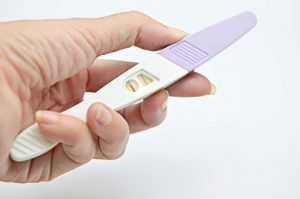 Polycystic ovarian syndrome (PCOS) can lead to infertility in women, but research suggests exercise and weight loss can help women regain fertility. Polycystic ovarian syndrome is an endocrine system disorder affecting female fertility and reproduction. Ovaries become enlarged and small collections of fluid build up. An ultrasound will be able to determine if a woman has PCOS.
Polycystic ovarian syndrome (PCOS) can lead to infertility in women, but research suggests exercise and weight loss can help women regain fertility. Polycystic ovarian syndrome is an endocrine system disorder affecting female fertility and reproduction. Ovaries become enlarged and small collections of fluid build up. An ultrasound will be able to determine if a woman has PCOS.
When diagnosing PCOS a doctor will look for these signs: irregular periods, excess androgen and polycystic ovaries. PCOS can worsen due to weight gain and obesity, so it’s important to maintain a healthy weight. Other signs of PCOS include abnormal hair growth, infrequent or prolonged periods and acne.
Advertisement
Causes of PCOS and related infertility in women
There isn’t an exact known cause of PCOS, but doctors speculate that excess insulin, low-grade inflammation and genes may play a role in the development of PCOS. Excess insulin can affect the ovaries by increasing the production of androgens. Androgens are common male hormones, but women require them to produce estrogen. An increase in androgen is what contributes to abnormal hair growth and can affect the ovaries abilities to ovulate and cause missed menstrual cycles.
Similarly low-grade inflammation, too, can affect the production of androgen.
Causes of infertility in women include:
 Ovulation disorders
Ovulation disorders- Uterine or cervical abnormalities
- Fallopian tube damage or blockage
- Endometriosis
- Primary ovarian insufficiency
- Pelvic adhesion
- Thyroid problems
- Cancer and cancer treatment
- Certain medications
- Being overweight
Losing weight helps women with PCOS regain fertility
 Being overweight and having PCOS contributes to infertility much more than having one or the other. A new study published in Endocrine Society’s Journal of Clinical Endocrinology and Metabolism found that weight loss and exercise can help infertility associated with PCOS.
Being overweight and having PCOS contributes to infertility much more than having one or the other. A new study published in Endocrine Society’s Journal of Clinical Endocrinology and Metabolism found that weight loss and exercise can help infertility associated with PCOS.
Previous research has shown that just a five percent loss in body weight is enough to dramatically improve the chances of pregnancy. Findings were evident in both men and women for improving infertility.
Doctors suggest that in order to improve your odds of getting pregnant, losing weight should be the top priority on your to-do list.
Study author, Richard S. Legro, said, “The findings confirm what we have long suspected – that exercise and a healthy diet can improve fertility in women who have PCOS. Making preconception lifestyle changes is beneficial, either alone or in combination with other pretreatment options.”
The study was based on the outcomes of 149 women with PCOS who either used birth control pills, lifestyle changes or a combination of both over the course of four months. The women were either overweight or obese but did not have other health conditions.
Of the 49 women on the pill, five gave birth. Those who changed their lifestyle saw 13 delivered babies, and in the combination group (50 women) 12 gave birth.
Researchers suggest that although there is no cure for PCOS, weight loss and exercise can be effective means in promoting fertility once again.
Prevention tips for PCOS and infertility
There isn’t an exact cause for PCOS, so unfortunately it cannot be prevented. However, it may be a good idea to keep your weight in check and continue with healthy lifestyle habits as a safe bet.
 On the other hand, there are many ways to prevent infertility, such as:
On the other hand, there are many ways to prevent infertility, such as:
- Exercise
- Don’t smoke
- Don’t gain excess weight
- Avoid alcohol
- Limit medications which may impact fertility
- Limit caffeine
Other complications of PCOS
Aside from infertility, PCOS can come with other complications if it’s not properly managed. Complications of PCOS include:
- Type 2 diabetes
- High blood pressure
- High cholesterol
- Metabolic syndromes
- Nonalcoholic steatohepatitis – severe liver inflammation
- Sleep apnea
- Depression and anxiety
- Cancer of the uterine lining
- Gestational diabetes
Related Reading:
Sperm gene could mean cure for infertility
According to the World Health Organization, infertility affects between 50 and 80 million people worldwide, and half of infertile couples fail to reproduce because of problems with the man’s fertility. Continue reading…
Advertisement
Success in fertility treatment associated with increased risk of depression
The University of Copenhagen has produced new research that shows women giving birth post fertility-treatment are at higher risk of depression than women not bearing a child following fertility treatment. Continue reading…
Sources:
http://www.mayoclinic.org/diseases-conditions/pcos/basics/complications
http://www.webmd.com/women/tc/polycystic-ovary-syndrome-pcos-symptoms
http://www.webmd.com/infertility-and-reproduction/polycystic-ovary-syndrome
http://www.mayoclinic.org/diseases-conditions/infertility/basics/prevention
